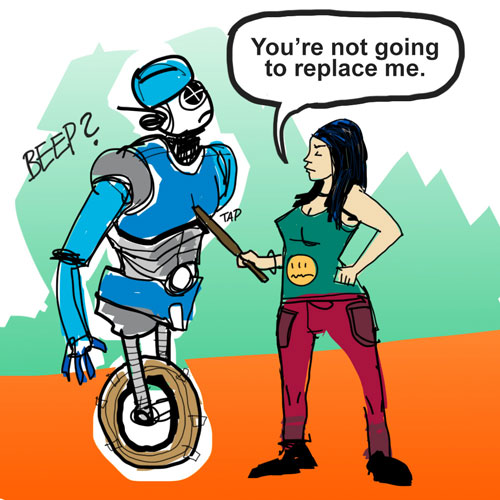
By Mars Dorian, {grow} Contributing Columnist
As an illustrating blogger and sci-fi author, I both fantasize and worry about the future.
On the one hand, I’m looking forward to 3D printers that recreate my limbs from DNA samples, nanomedicine where tiny robots travel through my bloodstream to repair cell damage and “Hyperloop” capsules that transport me at the speed of sound. But every great technology comes with a downside that can affect your career for the worse.
This is a lesson I’ve learned recently.
My hipster party
Last Saturday, I went to a hipster startup party in Berlin where I had a revealing conversation with a student who was worried about his father’s future. His dad, a life-long EU truck driver, had been shocked to learn that automobile giant Daimler tested its first self-driving trucks on the German Autobahn. The student relayed his father’s sentiment: “That’s the end of my job.”
I had a similar “Eureka!” moment when I was talking to a guy making his living as an Uber driver; he was boasting about how much more money he made than regular taxi drivers. Well, I hope the guy doesn’t read the article Autonomous Cars Will Destroy 10 Million Jobs and Reshape the Economy by 2025 by Zack Kanter. In that mind-boggling blog post, the author quotes Uber’s CEO Travis Kalanick, saying that he hopes to replace all of its drivers with self-driving cars.
These revelations made me ponder my own online career.
As digital creators, we tend to think we’re on the frontlines of the future, but with so many new apps and technologies sprouting up and the roboconomy looming on the horizon, it’s only a matter of time before you get sidelined by an automaton, too. That’s why I spent the last week trying to dig up every piece of advice I could find to help you and I stay relevant.
Here they are:
1. Foster the human element
I recently watched a Vice documentary about a Western guy checking out a Japanese robot hotel for the first time. Everything from the robot raptor receptionist (!) to the self-driving bellboy bot and the voice-activated room puppet was automated. Not a single human person served as personnel; even the food delivery was taken care of by smart vending machines.
By the end of the video, the reporter falls into bed and admits he feels isolated and misses the human touch. His conclusion? As long as regular hotels remain “human,” they will be the preferred choice.
I think this is relevant to our digital careers as well.
The reason I can make a living is because people have direct contact with me and can ask me questions any time. Big corporations, on the other hand, often prefer to simply try to sell you stuff instead of making the effort to engage. I’ve met with clients from across the world in my hometown, listened to their problems on Skype, and tried my best to find the common “human” link. A cartoonist friend of mine called Sarah Steenland, from Australia, is making herself unforgettable by sending personalized cartoon cards. This extra touch leaves a much stronger impression on the mind.
No matter which (online) business you’re in, it will always involve humans. So make yourself more relevant by giving it the extra human touch machines can’t (yet) provide:
- Reply as fast as you can on social media and don’t ignore mentions. From experience, I can tell you it’s emotionally draining to contact folks who never reply. I either think they’re arrogant or unreachable, and this makes me avoid them in the future.
- Check back on your clients wayyyyy after your business has concluded. I still contact clients from 1-2 years ago and ask about their whereabouts. They’re always pleasantly surprised and sometimes even bring me new jobs–either through referral or because they want to work with me again.
- Create unique gifts for your best clients.
Sarah Steenland,the cartoonist mentioned above, sends me personalized cards with my name embedded into the drawing. She says she does this for all the people she cares about. It’s a neat gesture that ensures I will remember her for ages to come. Needless to say, she’s now making a full-time living as a digital cartoonist while traveling the seas on her boat.

2. Build a virtual network independent of your geo-location
I live in Berlin but plan to go to Canada in 2016. It won’t change a thing for my career, because all of my most important connections are in the cloud:
- My most important readers/fans are on my email list.
- My social network is on Twitter.
- My core biz friends are added on Facebook.
As demands and economies change where you live, it’s foolish to make your entire digital career dependent on a single geographical spot. For example, illustration is not in great demand in Berlin. Thanks to my virtual network, I can still live here while working mostly with North Americans.
Make a deliberate effort to build friendship and business relationships across the web, and an entire world of career options can potentially open up for you.
3. Diversify by becoming a micro-entrepreneur
The cushy days of working for a single corporation for the rest of your life are over, even in Japan, where big companies used to reserve a grave plot for you in the corporate graveyard(!). Business life moves so fast nowadays that companies *cough* Fab *cough* skyrocket in one year and flop the next, massive layoffs included.
Meh. Don’t that let happen to you.
With digital distribution making it dirt-cheap to create your services and products and sell them worldwide, becoming a micro-entrepreneur becomes not only a possibility, but also a necessity. I make my money through digital illustration, Skype consulting and Amazon ebook sales.
Even when you’re currently “stuck” in a full-time job position, you can still have a consulting business on the side or self-publish ebooks on the internet. My friend Ryan Hanley works for an insurance company but crowdfunded his own marketing book “Content Warfare” and offers consulting via his online presence while providing for his family.
Get away from the notion of a company worker and instead become a micro-entrepreneur who juggles different projects. Thus, when one area gets outdone by an algorithm or bot, you can always shift your focus to the next project.
Conclusion
The BBC has created a fun little question box that asks whether a robot will take your job. If you type in your title, it will calculate your risk of getting replaced by an automaton. I typed in “author/writer” and received only a 33% probability of getting outsourced by a robot in the next 20 years. It’s a scary thought that some algorithm or smart C3P0 will take your job eventually, but if you want to not only survive but also thrive in the future, ensuring your relevance is
How are you future-proofing your (digital) career?



